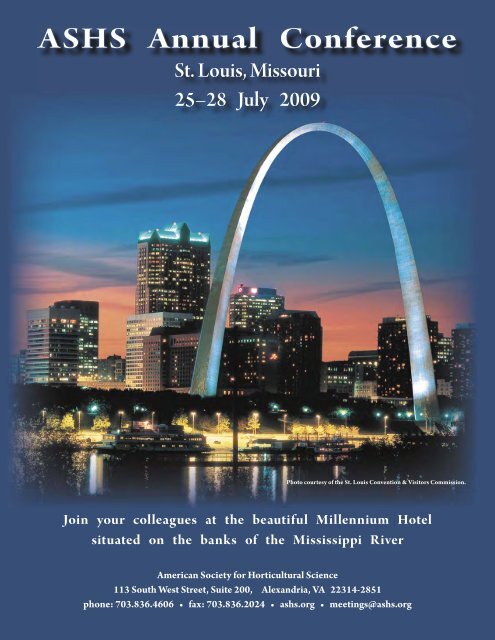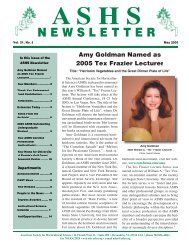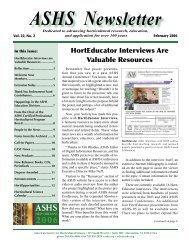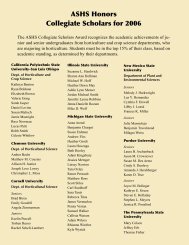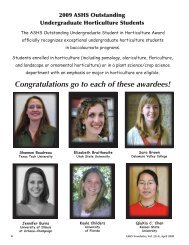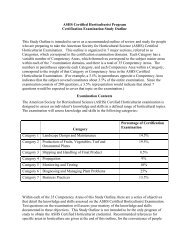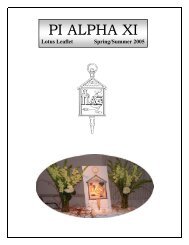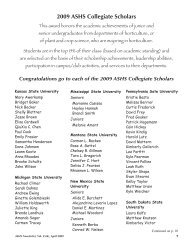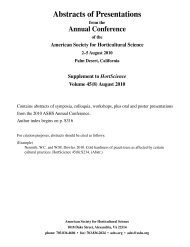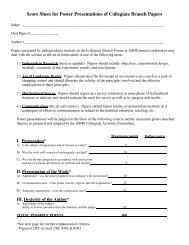ASHS Annual Conference - American Society for Horticultural Science
ASHS Annual Conference - American Society for Horticultural Science
ASHS Annual Conference - American Society for Horticultural Science
You also want an ePaper? Increase the reach of your titles
YUMPU automatically turns print PDFs into web optimized ePapers that Google loves.
A<strong>ASHS</strong> SHS <strong>Annual</strong> <strong>Conference</strong><br />
St. Louis, Missouri<br />
25–28 July 2009<br />
Photo courtesy of the St. Louis Convention & Visitors Commission.<br />
Join your colleagues at the beautiful Millennium Hotel<br />
situated on the banks of the Mississippi River<br />
<strong>American</strong> <strong>Society</strong> <strong>for</strong> <strong>Horticultural</strong> <strong>Science</strong><br />
113 South West Street, Suite 200, Alexandria, VA 22314-2851<br />
phone: 703.836.4606 • fax: 703.836.2024 • ashs.org • meetings@ashs.org
A Message from the President<br />
John R. Clark, President of the <strong>American</strong> <strong>Society</strong> <strong>for</strong> <strong>Horticultural</strong> <strong>Science</strong><br />
I want to invite you to join us at the 106th annual conference of the <strong>American</strong> <strong>Society</strong> <strong>for</strong> <strong>Horticultural</strong><br />
<strong>Science</strong> (<strong>ASHS</strong>), which will be held 25–28 July 2009 at the Millennium Hotel in St.<br />
Louis, Missouri. Th is conference facility is both economical with an unbelievable room rate,<br />
and the hotel is centrally located to enjoy all the great sites that St. Louis has to off er.<br />
Att ending the <strong>ASHS</strong> <strong>Annual</strong> <strong>Conference</strong> provides an outstanding opportunity to share science<br />
and education, network with colleagues, and to think about the future of horticultural<br />
science. <strong>ASHS</strong> is composed of public and private sector professionals who are engaged in<br />
teaching, research, extension, and industry, which makes horticultural science so rich. By attending<br />
this conference, we are able to revalidate the importance of the science of horticulture<br />
to the future.<br />
Th e conference provides an opportunity <strong>for</strong> working group members to socialize and plan<br />
<strong>for</strong> future events that support the <strong>Society</strong>. Att ending the <strong>ASHS</strong> <strong>Annual</strong> <strong>Conference</strong> provides<br />
a wonderful venue <strong>for</strong> undergraduate and graduate students to meet, compete and exchange<br />
ideas.<br />
We can’t <strong>for</strong>get to mention the wonderful professional and sightseeing tours off ered this year.<br />
Th ese tours will add to your overall enjoyment while att ending this year’s conference. Please<br />
note that these tours are reasonably priced—thanks to our fi ne member volunteers and the<br />
Headquarters staff .<br />
Th is conference has been made possible because of the commitment and hard work of our<br />
excellent <strong>ASHS</strong> Headquarters staff and the volunteer eff orts of hundreds of dedicated <strong>ASHS</strong><br />
members. I have a heartfelt appreciation <strong>for</strong> all of you.<br />
I hope everyone has an intellectually satisfying, fun, safe, and economically rewarding meeting.<br />
I look <strong>for</strong>ward to working and interacting with all of you at the conference.<br />
Sincerely,<br />
John R. Clark<br />
President<br />
Register online: ashs.org or call: 703-836-4606
<strong>ASHS</strong>–09<br />
<strong>ASHS</strong>–09 is a unique <strong>for</strong>um specifi cally designed <strong>for</strong><br />
horticultural scientists working in all branches of horticulture. Th e<br />
conference allows <strong>for</strong> an intense interchange of scientifi c in<strong>for</strong>mation<br />
through intensive colloquia, technical sessions, workshops, oral<br />
presentations as well as poster presentations.<br />
Here is a preview of the off erings scheduled <strong>for</strong> <strong>ASHS</strong>–09:<br />
(subject to change)<br />
At–A–Glance<br />
24 July – Pre-conference Events<br />
1:00–5:30 pm Missouri Botanical Garden and<br />
Forest Park Tour<br />
7:30 am–7:00 pm Nut Tour at the Horticulture<br />
Agro<strong>for</strong>estry Research Center<br />
25 July – <strong>Conference</strong> Day 1<br />
8:00 am–6:00 pm Working Group Business Meetings<br />
10:00 am–Noon Opening Plenary Session and<br />
William A. “Tex” Frazier Lecturer,<br />
Peter Raven<br />
10:30 am–4:00 pm Historic Neighborhoods and<br />
Beautiful Blooms Tour<br />
12:00–1:00 pm Award Recipients’ Recognition<br />
Reception<br />
Noon–12:45 pm Poster Sessions<br />
12:45–1:15 pm All Delegate Networking Lunch<br />
1:15–2:00 pm Poster Sessions<br />
2:00–5:30 pm The Anheuser-Busch Brewery<br />
Tour<br />
2:00–6:00 pm Colloquia & Workshop<br />
Presentations<br />
2:00–6:00 pm Certifi ed Horticulturist<br />
Examination<br />
4:00–5:00 pm Student Reception<br />
7:00–8:00 pm Welcome Reception<br />
(Sponsored by Monsanto)<br />
26 July – <strong>Conference</strong> Day 2<br />
8:00–9:00 am International/Global Peers<br />
Networking Breakfast<br />
8:00 am–Noon Colloquia, Workshop and Oral<br />
Presentations<br />
8:00 am–6:00 pm Working Group Business Meetings<br />
9:30 am–4:30 pm Forest Park Tour<br />
Noon–12:45 pm Poster Sessions<br />
Noon–2:00 pm Networking Luncheon: Topic TBA<br />
Noon–2:00 pm Pi Alpha Xi Members Luncheon<br />
1:15–2:00 pm Poster Sessions<br />
2:00–6:00 pm Workshop & Oral Presentations<br />
6:00–7:00 pm Industry Division Reception<br />
6:00–8:00 pm <strong>American</strong> Pomological <strong>Society</strong><br />
Board of Directors Meeting<br />
6:30-10:30 pm St. Louis: The Spooky and the<br />
Supernatural Tour<br />
7:00–9:30 pm All <strong>Society</strong> Dinner: Speaker TBA
At–A–Glance (continued)<br />
27 July – <strong>Conference</strong> Day 3<br />
8:00–10:00 am Administrators Breakfast<br />
8:00 am–Noon Colloquia, Workshop and<br />
Oral Presentations<br />
8:00 am–Noon Gateway to St. Louis Tour<br />
8:00 am–6:00 pm Working Group Business Meetings<br />
9:00 am–12:15 pm Undergraduate Student Tour:<br />
Missouri Botanical Garden<br />
10:00 am–5:00 pm Missouri Wine Country Tour<br />
Noon–12:45 pm Poster Sessions<br />
12:45–1:15 pm All Delegate Networking Lunch<br />
1:15–2:00 pm Poster Sessions<br />
2:00–3:30 pm <strong>ASHS</strong> <strong>Annual</strong> Business Meeting<br />
2:15–5:45 pm Graduate Student Tour:<br />
Monsanto Biotechnology<br />
3:30–6:00 pm Workshop & Oral Presentations<br />
6:00–8:00 pm <strong>American</strong> Pomological <strong>Society</strong><br />
<strong>Annual</strong> Business Meeting<br />
7:00–10:00 pm A Night at the Ball Park: St. Louis<br />
Cardinals Baseball<br />
28 July – <strong>Conference</strong> Day 4<br />
8:00 am–Noon Colloquia, Workshop and<br />
Oral Presentations<br />
8:00 am–4:00 pm Working Group Business Meetings<br />
9:00 am–3:30 pm The Anheuser-Busch<br />
Connection Tour<br />
Noon–12:45 pm Poster Sessions<br />
1:00–4:30 pm Professional Tour:<br />
Monsanto Biotechnology<br />
1:15–2:00 pm Poster Sessions<br />
2:00–4:00 pm Workshop & Oral Presentations<br />
<strong>Conference</strong> exhibitors showcase equipment, books,<br />
and other items of interest to the horticultural science<br />
community.<br />
Networking lunches on Saturday and Monday provide<br />
in<strong>for</strong>mal venues to converse with fellow conference<br />
attendees.<br />
Below: Hundreds of poster presentations showcase the latest in horticultural science research.<br />
Register<br />
Today and<br />
Save!<br />
ashs.org<br />
Click on<br />
<strong>Conference</strong>s ><br />
Registration<br />
Additional<br />
Info:<br />
703-836-4606
Keynote<br />
Speaker:<br />
Peter H. Raven<br />
Director, Missouri<br />
Botanical Garden<br />
Th e <strong>American</strong> <strong>Society</strong> <strong>for</strong> <strong>Horticultural</strong> <strong>Science</strong> welcomes Peter H. Raven as the 22nd William<br />
A. “Tex” Frazier Lecturer. Dr. Raven is President of the Missouri Botanical Garden, a world-class<br />
center <strong>for</strong> botanical research and education, and horticultural display.<br />
Described by Time Magazine as a “Hero <strong>for</strong> the Planet,” Raven champions research around the<br />
world to preserve endangered plants and is a leading advocate <strong>for</strong> conservation and a sustainable<br />
environment. He is the recipient of numerous prizes and awards, including the International Prize<br />
<strong>for</strong> Biology from the government of Japan and the U.S. National Medal of <strong>Science</strong>.<br />
About the Tex Frazier Lecture Series:<br />
Th e Tex Frazier Lecture series was named in honor of William A. “Tex” Frazier, an eminent member of<br />
the faculty at Oregon State University. Th e intent of the lecture series is: “to foster and promote reciprocal<br />
liaisons between <strong>ASHS</strong> and other professional groups; to recognize distinguished scholars and to bring<br />
their point of view to <strong>ASHS</strong> members; and to encourage the development of a holistic philosophy within<br />
the horticultural science profession so that <strong>ASHS</strong> members and students can enjoy the benefi ts of a broader<br />
perspective provided by an understanding of the interrelationship of seemingly diverse disciplines.”<br />
Past William A. “Tex” Frazier lecturers include: (2008) Philip E. Nelson, the 2007 World Food Prize<br />
Laureate, Purdue University; (2007) Bruce A. Kimball, Soil Scientist, Arid-Land Agricultural Research<br />
Center, Maricopa, AZ; and (2006) Paul Soniat, Director, New Orleans Botanic Garden<br />
Did you know . . . .<br />
Th e Climatron at the Missouri Botanical Garden, built in 1960, was the world’s fi rst climate-controlled geodesic<br />
dome designed as a greenhouse. Today, it houses a recreated rain <strong>for</strong>est fi lled with plants and uses E-feron glass to<br />
help it use solar energy more effi ciently. Th e Garden also is the site of the largest Japanese Garden in North America.<br />
Source: St. Louis Convention & Visitors Commission
Colloquia<br />
Join your colleagues <strong>for</strong> in-depth presentations on these issues of<br />
importance to all disciplines in today’s horticultural profession<br />
The Effi cient Use of Alternative<br />
Water and Traditional Irrigation<br />
Sources in Horticulture<br />
Moderator/Coordinator: Mengmeng Gu, Mississippi State<br />
University<br />
Sponsor: Water Utilization and Management (WUM)<br />
Working Group<br />
This colloquium will focus on effi cient use of both fresh<br />
and recycled water in horticultural crop production and in<br />
landscapes. Topics include: • Growth and physiological responses<br />
of plants to water stress and salinity stress related<br />
to irrigation with recycled water. • Health issues involved<br />
in edible horticultural crop production when irrigated with<br />
recycled water. • Infl uence of different quantities of fresh irrigation<br />
water or recycled water on horticulture production,<br />
yield, quality, and landscapes.<br />
Overview: The horticulture industry is facing a sharply<br />
decreased supply of fresh water <strong>for</strong> irrigation and growing<br />
competition <strong>for</strong> water resources from other economic sectors.<br />
The drought conditions that occur on a regular basis<br />
in many states have tremendously affected horticultural<br />
production, and raised awareness of more effi cient use of<br />
water resources and interest in alternative water resources,<br />
including recycled water. Different from the clean fresh water,<br />
recycled water might be associated with higher levels<br />
of salt content and the presence and persistence of contaminants,<br />
such as drugs, hormones, and pathogens. A myriad<br />
of research activities have contributed to our knowledge of<br />
growth and physiological responses of plants when crops are<br />
irrigated less, and yet, to date, there has not been a concerted<br />
ef<strong>for</strong>t to conserve, or use, recycled or reclaimed water <strong>for</strong><br />
horticultural production. Advanced systems are now being<br />
developed and implemented <strong>for</strong> these purposes. A panel<br />
consisting of members invited from the industry will demonstrate<br />
the latest technology and instruments applicable<br />
in research related to water application, conservation, and<br />
remediation, and stress physiology—especially water stress<br />
and salinity stress—and illustrate the key barriers to implementation<br />
in crop production and in the landscape.<br />
Understanding and Assessing<br />
Sustainability in Horticulture:<br />
Use of Life Cycle Analysis/<br />
Assessment (LCA) to Study and<br />
Improve Horticulture Sustainability<br />
Moderators/Coordinators: Curt R. Rom, University of<br />
Arkansas and Paolo Sambo, DAAPV - Universita di<br />
Padova, Italy<br />
Sponsor: Pomology (POM) Working Group<br />
Attendees will understand the utilization of LCA in their respective<br />
fi elds as a means of evaluating systems, technologies,<br />
production, storage, and processing sustainability.<br />
Overview: Measuring the sustainability of an agriculture<br />
enterprise and the impacts of the production system from<br />
“farm to <strong>for</strong>k” is diffi cult, but is becoming important. Many<br />
retail operations and governmental regulation agencies are<br />
requesting or requiring production, processing, and packaging<br />
vendors to provide measurements of the sustainability<br />
and impact of the inclusive production system. One of the<br />
methods used to assess the inputs, outputs, and impacts of<br />
the agricultural production system is life cycle analysis or<br />
assessment (LCA). During the past 10 years, LCA has been<br />
used in industrial as well as agriculture applications. The use<br />
of LCA has both scientifi c as well as practical applications<br />
in the development and evaluation of production techniques.<br />
Although becoming a standard <strong>for</strong> measuring inputs and<br />
impacts of production systems with many uses in animal<br />
production and food processing systems, the application to<br />
<strong>American</strong> horticulture production has been limited. It appears<br />
that there is an in<strong>for</strong>mation gap on the use of LCA to<br />
evaluate the inputs and impacts of horticulture production<br />
and processing systems in a “farm-to-<strong>for</strong>k” manner. Because<br />
of the value of LCA to research and the importance that LCA<br />
may have as a means <strong>for</strong> producers to document the inputs<br />
and impacts of their production system, this colloquium introduces<br />
the concept to horticulturists in order to stimulate<br />
validated research on horticulture crop production systems<br />
in the United States with implications <strong>for</strong> use worldwide.
Rising Above the Gathering Storm:<br />
The Future of Horticulture Higher<br />
Education<br />
Moderators/Coordinators : Dennis T. Ray, University of<br />
Arizona and Curt R. Rom, University of Arkansas<br />
Sponsors: Teaching Methods (TCHG) Working Group,<br />
the Education Division, and the Collegiate Activities<br />
Committee<br />
Colloquium attendees will be given in<strong>for</strong>mation on issues<br />
and opportunities facing horticulture higher education preparing<br />
students <strong>for</strong> the challenges of global competitiveness<br />
in the 21st Century.<br />
Overview: It has been posited that a “Quiet Crisis” in science<br />
and technology education in the United States is occurring<br />
due to the greying of the <strong>American</strong> scientists, a lack of<br />
well-trained scientists, and the educational programs preparing<br />
scientists to replace them. The crisis may lead to a lack<br />
of international competitiveness. Leaders appointed by the<br />
National Academy of <strong>Science</strong>s (NAS) studied U.S. global<br />
competitiveness and reported recommendations in “Rising<br />
Above the Gathering Storm; Energizing and Employing<br />
America <strong>for</strong> a Brighter Future,” stating problems and solutions<br />
in training and retaining the best and the brightest in sciences<br />
and technology. The Board of Agriculture and Natural<br />
Resources under the aegis of the NAS held a “Leadership<br />
Summit to Effect Change in Teaching and Learning Agriculture<br />
<strong>Science</strong>” to stimulate change in agriculture higher education.<br />
Goals were to enhance excellence in higher education,<br />
increase collaborative and integrative ef<strong>for</strong>ts of education<br />
and research, increase communication among the scientifi c<br />
professions, to foster integration of teaching, research, and<br />
outreach, and to set a national agenda <strong>for</strong> higher education in<br />
academic programs in agriculture and the life sciences. This<br />
leadership summit was a call to arms to think about a new<br />
academic mission, to rethink the “land grant mission” of agriculture<br />
education. The colloquium will present big-picture<br />
perspectives on agriculture higher education and scientifi c<br />
competitiveness with some focus on specifi c challenges and<br />
opportunities faced in horticulture education.<br />
For the latest updates to conference<br />
programming, visit the <strong>ASHS</strong> web site,<br />
ashs.org<br />
Click on<br />
<strong>Conference</strong>s > Technical Program<br />
Food Safety of Fresh Fruits and<br />
Vegetables: What Can Be Done to<br />
Minimize the Risks?<br />
Moderator/Coordinator: Jinhe Bai, Citrus and Subtropical<br />
Products Lab, USDA-ARS, Winter Haven, FL<br />
Sponsors: Postharvest (PH) and Vegetable Breeding<br />
(VGBR) Working Groups<br />
This colloquium will bring together leaders in the fi elds of<br />
postharvest physiology, plant breeding, food microbiology,<br />
and environment science to address the needs <strong>for</strong> genetically<br />
enhancing produce safety, preventing outbreaks, and development<br />
of new cultivars exhibiting resistance to food-borne<br />
microorganisms.<br />
Overview: Fruits and vegetables are an important part of<br />
human diet. It is recommended by the <strong>American</strong> Cancer<br />
<strong>Society</strong> that consumers eat at least fi ve servings or more of<br />
fruits and vegetables each day. However, each year, people<br />
get sick from foods that have not been properly grown, handled,<br />
refrigerated, or cooked. Fruits and vegetables can pick<br />
up chemicals and microorganisms as they are being grown,<br />
harvested, handled, packed, shipped, and marketed. Providing<br />
consumers with safe, wholesome fruits and vegetables is<br />
the fi rst priority of agricultural and food scientists and industries.<br />
Various approaches have been tried to reduce microbial<br />
contamination and include: proper pre- and postharvest<br />
practices followed by the Good Agricultural Practice (GAP)<br />
and Hazard Analysis and Critical Control Points (HACCP)<br />
programs rapid detection of toxic chemicals and microbials<br />
breeding <strong>for</strong> new cultivars with resistance to food borne<br />
microorganisms traceability, etc. This colloquium will address<br />
the major technologies <strong>for</strong> ensuring fruit and vegetable<br />
safety, to help the industry to improve quality and safety of<br />
fresh and fresh-cut products.<br />
To the sponsoring <strong>ASHS</strong><br />
Working Groups and Committees,<br />
as well as to the<br />
selection committee members,<br />
individual speakers,<br />
and coordinators <strong>for</strong> each<br />
colloquium, thank you.<br />
Don’t miss these timely presentations!<br />
Register Today to Attend the<br />
2009 <strong>ASHS</strong> <strong>Annual</strong> <strong>Conference</strong><br />
Register online: ashs.org<br />
or call: 703-836-4606
Th e <strong>ASHS</strong> <strong>Annual</strong> <strong>Conference</strong><br />
off ers many activities<br />
<strong>for</strong> those who are beginning<br />
their horticultural careers<br />
Saturday, 25 July 2009<br />
Tex Frazier Lecture—Peter H. Raven<br />
Graduate Student Poster Competition (scheduling TBD)<br />
Undergraduate Oral Competition (scheduling TBD)<br />
Public Garden Workshop<br />
Undergraduate Poster Session<br />
Student Reception<br />
Sunday, 26 July 2009<br />
<strong>ASHS</strong> Primer—att ending a professional conference<br />
Graduate Student Poster Competition (scheduling TBD)<br />
ACB <strong>Annual</strong> Business Meeting<br />
Commodity Judging Contest<br />
Monday, 27 July 2009<br />
Missouri Botanical Garden Tour<br />
<strong>Annual</strong> Business Meeting<br />
Monsanto Biotechnology Tour<br />
Designed With You in Mind . . . .<br />
Student Tours<br />
Graduate Students<br />
Monsanto Biotechnology<br />
Monday, 27 July 2009 2:15–5:45 pm<br />
Th e Monsanto Biotechnology facility in Chesterfi eld, Missouri,<br />
is a center <strong>for</strong> the company’s research on improving<br />
agronomic crop production.<br />
Undergraduate Students<br />
Missouri Botanical Garden<br />
Monday, 27 July 2009 9:00 am - 12:15 pm<br />
Founded in 1859, the Missouri Botanical Garden is the nation’s<br />
oldest botanical garden in continuous operation and a<br />
National Historic Landmark. Th e Garden is a center <strong>for</strong> botanical<br />
research and science education, as well as one of the<br />
world’s largest collections of rare and endangered orchids.<br />
Poolside Reception <strong>for</strong> Students!<br />
Saturday, 25 July 2009, 4:00–5:00 pm<br />
Not-to Miss Events . . .<br />
<strong>for</strong> Students<br />
(subject to change)<br />
<strong>ASHS</strong> Graduate Student<br />
Poster Competition<br />
All graduate students are encouraged<br />
to participate in the <strong>ASHS</strong><br />
Graduate Student Poster Competition.<br />
Winners receive prizes and<br />
are acknowledged in the <strong>ASHS</strong><br />
Newslett er.<br />
<strong>ASHS</strong> Undergraduate<br />
Student Oral and Poster<br />
Competitions<br />
Undergraduate students, including<br />
members of clubs affi liated<br />
with the Association of Collegiate<br />
Branches (ACB) and individual<br />
<strong>ASHS</strong> student members, are invited to submit research<br />
project reports <strong>for</strong> presentation and judging in the Undergraduate<br />
Poster and Oral Competitions.<br />
Th e Rules:<br />
• Students must indicate if they would like to be included in these<br />
competitions at the time that their abstract is submitt ed.<br />
• In addition to signing up <strong>for</strong> the competitions at the time of abstract<br />
submission, students must also register to att end the <strong>Conference</strong>.<br />
• Only the author who presents the paper is eligible <strong>for</strong> the award.<br />
• Students’ presentations are limited to one per student and may<br />
be either an oral or poster presentation, but not both.<br />
Complete competition guidelines are posted on the <strong>ASHS</strong> web site.<br />
ashs.org Click on <strong>Conference</strong>s > Submissions<br />
Th e ACB <strong>Horticultural</strong> Commodity<br />
Judging and Plant<br />
Identifi cation Contests are<br />
held at each <strong>ASHS</strong> <strong>Annual</strong><br />
<strong>Conference</strong>. Undergraduate<br />
students from member clubs<br />
compete by rating the quality<br />
of horticultural commodities,<br />
identifying a large number of plants, many from out of<br />
their region, and by taking a general exam of horticultural<br />
knowledge.
Tours <strong>ASHS</strong>–09<br />
Especially <strong>for</strong> the Horticulture Professional:<br />
Professional Tour:<br />
Missouri Botanical Garden<br />
and Forest Park<br />
Friday, 24 July 2009<br />
1:00–5:30 pm<br />
Founded in 1859, the Missouri Botanical Garden is the nation’s<br />
oldest botanical garden in continuous operation and<br />
a National Historic Landmark. Th e Garden is a center <strong>for</strong><br />
botanical research and science education, as well as an oasis<br />
in the city of St. Louis. Th e Garden offers<br />
79 acres of beautiful horticultural<br />
display, including a 14-acre Japanese<br />
strolling garden, Henry Shaw’s original<br />
1850 estate home, and one of the<br />
world’s largest collections of rare and<br />
endangered orchids.<br />
Photos courtesy of the Missouri Botanical Garden<br />
Nut Tour at the University of Missouri Horticulture<br />
and Agro<strong>for</strong>estry Research Center<br />
Friday, 24 July 2009<br />
7:00 am–7:00 pm<br />
Tour highlights northern pecan, eastern black walnut, and<br />
Chinese chestnut research at the University of Missouri Horticulture<br />
and Agro<strong>for</strong>estry Research Center (HARC) in New<br />
Franklin, Missouri. Cultivars in the clonal repositories will be<br />
featured, a trellised walnut planting, rootstock trials, as well as<br />
a unique fl ood tolerance laboratory. Breeding, cultivar/rootstock<br />
selection, propagation, crop management, and marketing<br />
research will be discussed by MU faculty. Harvest and<br />
hulling equipment designed <strong>for</strong> these crops will be displayed.<br />
Sponsored by the Temperate Tree Nut Crops (NUTS) Working<br />
Group.<br />
Monsanto Biotechnology<br />
Tuesday, 28 July 2009<br />
1:00–4:30 pm<br />
Monsanto is a global leader in agricultural biotechnology.<br />
Th e Monsanto Biotechnology facility in Chesterfi eld, Missouri,<br />
is a center <strong>for</strong> the company’s research on improving<br />
agronomic crop production (primarily corn,<br />
soybeans, cott on, and canola). Th e tour will<br />
highlight the workings of the “pipeline”—<br />
from trans<strong>for</strong>mation to commercial release<br />
of crops with improved traits, including pest<br />
resistance, drought tolerance, nitrogen use<br />
effi ciency, and increased yield.<br />
Photo and logo courtesy of Monsanto.<br />
Something <strong>for</strong> every conference att endee:<br />
Sightseeing Tours<br />
Historic Neighborhoods and Beautiful Blooms<br />
Saturday, 25 July 2009<br />
10:30 am–4:00 pm<br />
Driving overview of the Soulard and Lafayett e<br />
Square neighborhoods, with stops at the Soulard<br />
Market and Missouri Botanical Garden.<br />
Th e Anheuser-Busch Brewery & Ted Drewes<br />
Saturday, 25 July 2009<br />
2:00–5:30 pm<br />
Includes a tour of the Anheuser-Busch Brewery and<br />
Ted Drewes Frozen Custard.<br />
Forest Park – “Meet Me in St. Louis”<br />
Sunday, 26 July 2009<br />
9:30 am–4:30 pm<br />
Overview of Forest Park with a shutt le between the<br />
<strong>Science</strong> Center, History Museum, the Saint Louis<br />
Zoo, and the Art Museum <strong>for</strong> the remainder of the<br />
day. Lunch is available on your own at each att raction.<br />
St. Louis: Th e Spooky and the Supernatural<br />
Sunday, 26 July 2009<br />
6:30–10:30 pm<br />
Haunted history tour of St. Louis with stops at the<br />
Lemp Mansion, Lafayett e Park and Square, and Midtown<br />
St. Louis.<br />
Gateway to St. Louis Introductory Tour<br />
Monday, 27 July 2009<br />
8:00 am–12:00 pm<br />
Enjoy views of Laclede’s Landing, the Old Cathedral,<br />
the Old Courthouse and Busch Stadium. Take<br />
a tram ride at the Gateway Arch, and more.<br />
Missouri Wine Country<br />
Monday, 27 July 2009<br />
10:00 am–5:00 pm<br />
Tour Mount Pleasant Winery.<br />
Th e Anheuser-Busch Connection<br />
Tuesday, 28 July 2009<br />
9:00 am–3:30 pm<br />
Includes a tram tour of Grant’s Farm, lunch at Bevo<br />
Mill, and a tour of the Anheuser-Busch Brewery.<br />
Photo: courtesy of the St. Louis Convention & Visitors Commission.
Each year,<br />
<strong>ASHS</strong> anticipates approximately 1,000-1,300 att endees at its<br />
annual conference. Many sponsorship options are available depending on your<br />
budget and particular area of interest.<br />
Let us discuss how to make sponsorship at <strong>ASHS</strong> annual conferences work <strong>for</strong><br />
you. Included in your sponsorship package is an unmanned station <strong>for</strong> promotional<br />
literature/products in a high traffi c area and a 1/4 page ad space in the<br />
Program and Abstracts issue of Hort<strong>Science</strong>, which is distributed to all conference<br />
att endees and the <strong>ASHS</strong> membership at large.<br />
Bonus! Sponsor an <strong>ASHS</strong> food function or conference bags, and receive a complimentary<br />
booth in the Exhibition Hall.<br />
Th ank you, Monsanto, <strong>for</strong><br />
Sponsoring this year’s<br />
Welcome Reception.<br />
Th ank you,<br />
Delaware Valley College,<br />
<strong>for</strong> providing badge lanyards.<br />
10 Reasons to exhibit at <strong>ASHS</strong>–2009<br />
1 Count up the numerous opportunities to speak one-on-one to the<br />
best and brightest minds in horticultural science.<br />
2 Introduce your latest products and services.<br />
3 Generate interest in your company’s mission and goals.<br />
4 Acquire cutting-edge research knowledge in global horticultural<br />
science.<br />
5 Cultivate new business contacts.<br />
6 Rejuvenate existing business relationships.<br />
7 Take advantage of additional promotion and exposure to a global<br />
audience.<br />
8 Increase your company’s presence on an international level.<br />
9 Position your company as a leader to an international audience.<br />
10 Network with other <strong>ASHS</strong>–2009 exhibitors!<br />
Sponsorship<br />
and<br />
Exhibitor<br />
Opportunities<br />
Here is a sampling of sponsorship opportunities:<br />
Coff ee Break (in Poster/Exhibit Hall)—$800–$1000<br />
International Breakfast—$750<br />
Industry Division Reception—$1000<br />
Poolside reception <strong>for</strong> graduate & undergraduate students—$800<br />
<strong>Conference</strong> Floral Decorations—$800<br />
<strong>Conference</strong> Bags (Includes your company name/logo)—approx. $5,000<br />
All Delegate Lunch—$3000 served on the 1st and 3rd days of the conference<br />
Aft ernoon Break (beverages)—in Exhibit Hall $800–$1000<br />
Adjustments can be made to the above-mentioned items<br />
based on your company’s interests.<br />
Contact <strong>ASHS</strong><br />
meetings@ashs.org<br />
<strong>for</strong> additional<br />
in<strong>for</strong>mation on<br />
sponsorship and<br />
exhibitor options.<br />
Application contracts <strong>for</strong> Exhibitors are available as downloads from the <strong>ASHS</strong> web site<br />
ashs.org Click on <strong>Conference</strong>s >Exhibitors/Sponsors
Luncheons<br />
Receptions<br />
and<br />
Other Events<br />
Welcome Reception<br />
Saturday, 25 July, 7:00–8:00 pm<br />
Come celebrate our 106th birthday at the opening<br />
reception <strong>for</strong> the <strong>ASHS</strong>-2009 <strong>Annual</strong> <strong>Conference</strong>.<br />
Meet and greet your colleagues and friends while<br />
enjoying some light snacks (this event is not planned<br />
as a dinner function). Admission to the reception is<br />
complimentary <strong>for</strong> registered attendees; however,<br />
there is a fee <strong>for</strong> guests.<br />
International/Global Peers Networking<br />
Breakfast<br />
Sunday, 26 July, 8:00–9:00 am<br />
This breakfast is in recognition of <strong>ASHS</strong>’ diverse<br />
international membership from over 100 countries.<br />
Network with your international colleagues who have<br />
come from different parts of the world. All delegates<br />
are invited to attend this event (including those from<br />
the United States).<br />
Did you know . . .<br />
Th e Gateway Arch commemorates the Louisiana<br />
Purchase and the westward expansion<br />
of the United States. It also symbolizes St.<br />
Louis’ role as the Gateway to the West.<br />
Th e 1904 World’s Fair in St. Louis popularized<br />
a number of new foods: Th e hot dog . . .<br />
the hamburger . . . the ice cream cone . . . and<br />
iced tea.<br />
In 1904, the fi rst Olympiad to be held in the U.S.<br />
was held in St. Louis at Washington University’s<br />
Francis Field.<br />
Source: St. Louis Convention & Visitors Commission<br />
Here is a quick preview of some of<br />
the luncheons, receptions, and<br />
other events currently being<br />
planned <strong>for</strong> <strong>ASHS</strong>–09:<br />
Play Ball!<br />
St. Louis Cardinals Baseball<br />
Monday, 27 July 2009, 7:00 pm<br />
Aft er a long day of workshops, you can take<br />
a seat in the new Busch Stadium to enjoy a<br />
major league game between the St. Louis<br />
Cardinals and the LA Dodgers. <strong>ASHS</strong> Headquarters<br />
has arranged <strong>for</strong> a special group rate<br />
<strong>for</strong> conference att endees and their guests.<br />
Busch Stadium is just a short walk from the<br />
Millennium Hotel. Ticket prices and further<br />
in<strong>for</strong>mation to reserve seats will be posted<br />
to the web site when available.<br />
Member/Colleague Luncheon/Session<br />
Sunday, 26 July, 12:00–2:00 pm<br />
Topic: TBD<br />
Industry Reception<br />
Sunday, 26 July, 6:00–7:00 pm<br />
This event is open to all, and brings together<br />
members from the private industry with the<br />
rest of the membership in a casual setting<br />
designed to foster conversation.<br />
All <strong>Society</strong> Dinner<br />
Sunday, 26 July, 7:00–9:30 pm<br />
Hosted by: <strong>ASHS</strong> Extension Division<br />
Speaker: TBD
<strong>ASHS</strong>–2009 Host Hotel<br />
Th e Millennium Hotel St. Louis is situated on the banks<br />
of the Missis sippi River adjacent to the city’s landmark<br />
att raction, the Gateway Arch. Th e hotel’s location is in<br />
the heart of all that St. Louis has to off er, including the<br />
city’s best dining, entertainment and sporting venues.<br />
Four major interstates are accessible within two blocks<br />
of the hotel, and Lambert International Airport is just<br />
15 minutes away.<br />
Reservations: ashs.org<br />
Click on <strong>Conference</strong>s > Arrangements<br />
Room Rates:<br />
Superior Room (single/double) = $96.00 per night<br />
Standard Room (single/double) = $76.00 per night<br />
Limited number of rooms available at this rate<br />
$20 per additional person in any room.<br />
Note: If room sharing, contact 1-800-325-7353 to<br />
provide names of those sharing a room with you.<br />
*See Facilities Usage Fee below.<br />
Did you know . . .<br />
Located atop the Millennium Hotel, Top of the Riverfr ont is St. Louis’ only<br />
revolving restaurant. Off erings include distinctive regional <strong>American</strong> cuisine and<br />
a spectacular panoramic view of the city and Gateway Arch.<br />
Source: www.millenniumhotels.com/millenniumstlouis/<br />
* Facilities Usage Fee ($250)<br />
Where to stay? We know that, <strong>for</strong> many attendees,<br />
fi nding the lowest possible hotel rate is<br />
paramount, and we are aware that often people<br />
choose to stay on the outskirts of town and then<br />
choose to drive to the conference each day.<br />
However, be<strong>for</strong>e you book your hotel room <strong>for</strong><br />
the <strong>ASHS</strong> <strong>Annual</strong> <strong>Conference</strong>, we want to mention<br />
the following ....<br />
The <strong>American</strong> <strong>Society</strong> <strong>for</strong> <strong>Horticultural</strong> <strong>Science</strong><br />
continues to make every ef<strong>for</strong>t to keep costs at a<br />
minimum <strong>for</strong> those attending the <strong>ASHS</strong> <strong>Annual</strong><br />
<strong>Conference</strong>. One way this is done is to make a<br />
commitment to the Millennium Hotel that a specifi<br />
ed number of hotel rooms will be occupied by<br />
our conference attendees. In exchange <strong>for</strong> the<br />
hotel room occupation, the property provides<br />
<strong>ASHS</strong> with complimentary meeting space.<br />
Over the last several years, many unsuccessful<br />
attempts have been made to explain this pro-<br />
cess to conference delegates. In 2004, <strong>ASHS</strong> did<br />
not fi ll its committed number of sleeping rooms,<br />
and, as a result, faced hefty penalty fees. Individuals<br />
who choose to stay at non-host hotels receive<br />
the benefi t of the conference facilities, but<br />
do not contribute to the necessary commitments<br />
that allow the <strong>Society</strong> to use meeting space on a<br />
complimentary basis.<br />
There<strong>for</strong>e, the <strong>ASHS</strong> Board of Directors instituted<br />
a “Facilities Usage Fee” <strong>for</strong> those who attend<br />
the conference, but choose not to stay in<br />
the host hotel. This is the only way that we can<br />
continue to run the conference without raising<br />
registration fees.<br />
The $250 Facilities Usage Fee will apply<br />
only to those who register (including exhibitors,<br />
speakers, students, etc.) <strong>for</strong> the conference (with<br />
the exception of guests), but choose not to stay<br />
at the host hotel.<br />
We encourage all conference attendees to avoid<br />
this Facilities Usage Fee and stay at the host hotel.<br />
200 South 4th Street<br />
St. Louis, MO<br />
USA 63102-1804<br />
Travel Discounts!<br />
<strong>American</strong> Airlines is off ering a 5% discount to <strong>ASHS</strong> conference<br />
att endees on your fl ight to St. Louis, Missouri.<br />
To obtain this discount, go to the url below and follow<br />
the prompts: www.ashs.org/index.php?option=com_<br />
content&view=article&id=547:2009-travel-andtransportation&catid=77:arrangements&Itemid=82<br />
Renting a car?<br />
AVIS is off ering a special rate <strong>for</strong> <strong>ASHS</strong><br />
<strong>Conference</strong> att endees. To obtain this<br />
discount, click go to the url below and follow<br />
the prompts: www.ashs.org/index.php?option=com_<br />
content&view=article&id=547:2009-travel-andtransportation&catid=77:arrangements&Itemid=82<br />
Please be aware that if you are sharing a room<br />
with another delegate, both names must appear<br />
on the room reservation by the hotel reservation<br />
cut-off date, otherwise you will be assessed this<br />
fee and obligated to pay it in order to pick up your<br />
registration credentials.<br />
Staying at the host hotel makes it easy to enjoy<br />
the camaraderie of fellow <strong>ASHS</strong> Members inside<br />
and outside of scheduled activities.<br />
Just imagine - no commuting time to conference<br />
activities; additional networking time with<br />
colleagues; and amenities, such as room service,<br />
safes, exercise facilities, and restaurants/shops -<br />
everything in one convenient location.<br />
It certainly is your choice as to where you desire<br />
to stay during the conference, but please<br />
understand that <strong>ASHS</strong> does have contractual<br />
commitments that we must honor, and we must<br />
do all we can to assure that there are no negative<br />
fi nancial implications to the <strong>Society</strong> and the<br />
<strong>ASHS</strong> Membership.
2009 Registration Rates<br />
On or be<strong>for</strong>e 1 April 2009 2 April–15 June 2009 16 June+ and on-site<br />
Category Early-Bird Regular LATE<br />
<strong>ASHS</strong> Member $ 395 $ 450 $ 500<br />
Non-Member $ 560 $ 610 $ 660<br />
Emeritus $ 245 $ 330 $ 380<br />
Postdoctoral (Member) $ 260 $ 285 $ 335<br />
Postdoctoral (non-Member) $ 325 $ 350 $ 400<br />
Graduate student (Member) $ 125 $ 150 $ 200<br />
Graduate student (non-Member) $ 185 $ 225 $ 275<br />
Undergraduate student $ 95 $ 115 $ 165<br />
*One day (Member) $ 135 $ 160 $ 210<br />
*One day (non-Member) $ 240 $ 265 $ 315<br />
* If you plan to attend the conference <strong>for</strong> more than one day, a full conference registration is required. Two-day registrations<br />
are not permitted.<br />
For any questions that you would like to make to your registration, you can either contact <strong>ASHS</strong> at 703-836-4606 or e-mail<br />
your request to meetings@ashs.org.<br />
Any cancellation or refund requests must be made in writing and can be emailed to meetings@ashs.org or mailed to <strong>ASHS</strong>–<br />
2009, 113 S West St., Suite 200, Alexandria, VA 22314-2851.<br />
Register online: ashs.org Click on <strong>Conference</strong>s > Registration
<strong>ASHS</strong>–2009 features<br />
intensive colloquia, technical sessions,<br />
workshops, and presentations of the<br />
latest in horticultural research.<br />
<strong>ASHS</strong> <strong>Annual</strong> <strong>Conference</strong><br />
25-28 July 2009<br />
St. Louis, Missouri<br />
Register today!<br />
ashs.org<br />
<strong>American</strong> <strong>Society</strong> <strong>for</strong> <strong>Horticultural</strong> <strong>Science</strong> • 113 South West Street, Suite 200, Alexandria, VA 22314-2851<br />
phone: 703.836.4606 • fax: 703.836.2024 • ashs.org • meetings@ashs.org


